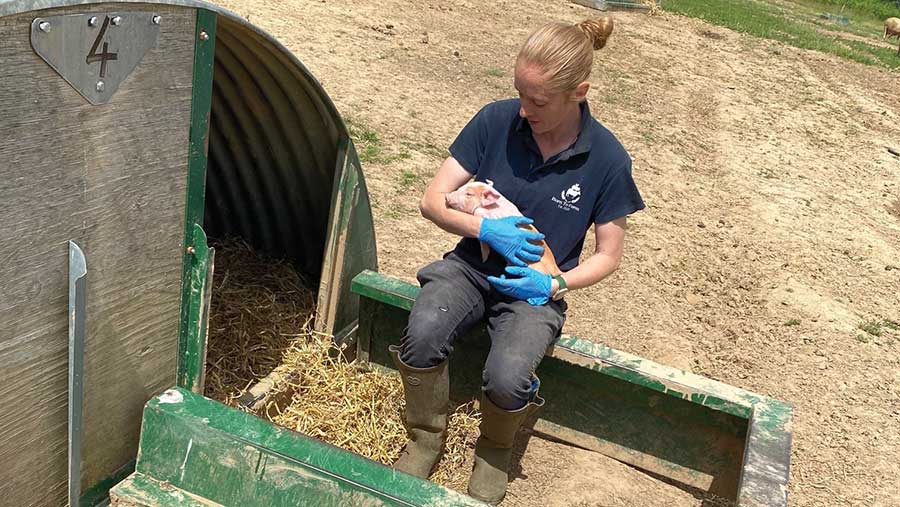Farming careers: Working as a pig unit manager
 © Ruth Thomas
© Ruth Thomas Ruth Thomas, 32, is the manager of 1,100 breeding sows and a 4,000-place nursery site on a 48ha farm in Norfolk.
The outdoor breeding unit has just been converted from a four-week wean to a five-week wean, and also produces replacement gilts. In the nursery, she is responsible for vaccinating and sexing the piglets that leave the farm.
The business is in the process of obtaining planning permission to add two new fattening sheds to hold 1,900 pigs, which the nursery would feed into.
See also: Farming careers: Working as a pig stockperson
Route into the job
Ruth was brought up on a smallholding and always loved being around the animals. Leaving school at 16, she was unsure what she wanted to do and started working at a leisure centre, where she completed an accounting technician diploma, which comes in handy in her current role.
She did apply for a few stockperson positions during this time but said it was difficult to get into as a female farmer.
Meanwhile, Ruth spent her free time helping out on a nearby livestock farm, and when the business was expanded in August 2014, she was offered the chance to become a full-time employee and run the breeding unit, which she jumped at.
Ruth worked on a different unit for three months to learn as much as she could. Her first gilts arrived that December and the job has grown ever since.
She has done several training courses through AHDB Pork, including the Stockperson Development Scheme, Stockperson Plus and Stockperson Pro, which she said were really useful and taught her a lot.
Now Ruth manages three full-time and two part-time members of staff and the day-to-day running of the unit, working alongside the farm owner.
Most of her time is spent feeding and checking pigs, farrowing, artificial insemination, weaning, sexing and vaccinating, as well as training her team.
She also takes care of all the paperwork, including VAT returns and staff payroll, and in the summer helps with baling and bringing in the straw.
“You do not need to have any qualifications to do this job and sometimes it is easier when people haven’t done anything like this before because I can train them my way,” Ruth said.
“I love the variation of the job; no day is ever the same. The pigs are my real love because they all have different characters, and I love working outside.”
Job profile
What does the job involve?
Being responsible for: planning the daily routine, team management and development, maintaining safe working practices and protocols, recording and managing data, and working with the vet to maintain health and production efficiency.
What experience is needed?
A sound technical understanding of pig production is needed, along with good people skills, including communication, an understanding of learning styles, and coaching skills.
How can you gain the necessary experience?
The pig production skills are generally learned by working in and progressing through the industry. Development of people skills can be gained from recognised management and leadership courses.
Additional courses that benefit this role could also be sourced via colleges and bodies such as the AHDB.
What funding is available?
Most employers recognise the additional skills their managers need for this role and provide training opportunities with funding.
The AHDB also helps facilitate this by linking training providers with producers and, in some cases, providing these courses on a partly funded basis.
What are the benefits of this job?
Working in some of the most picturesque parts of the countryside, and although the work is routine, it can be very rewarding when part of a high-performing team and productive unit.
The challenge of making the unit perform and developing new staff can be very satisfying.
What would a typical salary be?
Packages start at about £25,000/year depending on experience and track record.
Progression and proven performance can take the salary to about £40,000-£45,000 with a house, vehicle usage, health insurance and additional annual leave.
How can you progress in this role?
Progression from being a unit manager is often a personal choice reflective of choosing a more hands-off career path.
This could include becoming a fieldsperson for a large company looking after several units, working as a technical expert for an allied industry or taking the plunge and starting your own unit.
How can employers best manage and maintain staff for this role?
Key factors include providing good, well-maintained, modern equipment, creating a business ethos that encourages staff development, and an understanding of the need to improve work-life balance for the manager and the team they lead.
Source: Andrew Palmer, AHDB pork knowledge exchange relationship manager
